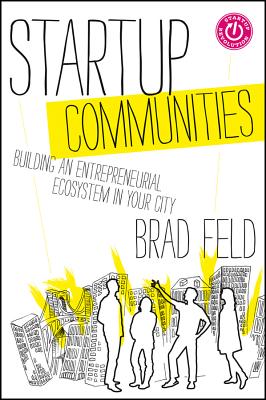Startup Communities
November 29, 2012
In the foreward to Brad Feld's most recent book, Startup Communities, Steve Case begins: During the past three decades, startups in the United States have created 40 million American jobs, all the net job creation in the country over that period. As we recover from a deep recession, our ability to innovate, build iconic companies, put people back to work, and inspire the world will once again be determined by whether entrepreneurs continue taking chances on a dream to start a business. This point demonstrates the importance of Startup Communities.
 In the foreward to Brad Feld's most recent book, Startup Communities, Steve Case begins:
In the foreward to Brad Feld's most recent book, Startup Communities, Steve Case begins:
During the past three decades, startups in the United States have created 40 million American jobs, all the net job creation in the country over that period. As we recover from a deep recession, our ability to innovate, build iconic companies, put people back to work, and inspire the world will once again be determined by whether entrepreneurs continue taking chances on a dream to start a business.This point demonstrates the importance of Startup Communities. Somewhat similar to how Chris Guillibeau created The $100 Startup for first-time 'solopreneurs', Feld has created a kind of field guide for what he calls startup communities, clusters of startup activity inside a common geographic location. But Startup Communities is much more philosophical. The book is formatted such that it provides plenty of case studies that demonstrate success and sustainability, and Feld uses as a primary example Boulder, Colorado, a community he personally has worked inside of for nearly two decades. Feld asserts that Boulder may have the highest 'entrepreneurial density' in the world. Leave it to a serial entrepreneur to create new words and phrases where they are needed—Feld defines his entrepreneurial density this way: (number of entrepreneurs + number of people working for startups or high growth companies)/adult population. Looking at the common explanations for why entrepreneurial success seems to naturally form these geographic clusters, we get an array of contributing factors: economy, geography and sociology. These three frameworks are how we have previously understood the startup community phenomena occurring across the US and globally. And now we have a fourth, with what Feld dubs The Boulder Thesis. This new framework identifies startup aggregation to a kind of intrinsic set of qualities that entrepreneurs tend toward. Entrepreneurs must be leaders, they must be committed, they must be inclusive and inviting, and they must be proactive at engaging their community. These four qualities might explain why startups form clusters; entrepreneurs are productive and magnetic, creating industry and drawing others to it naturally. Throughout Startup Communities, Brad Feld brings into focus exactly which qualities define sustainable entrepreneurial clusters and how these communities can draw on other elements to thrive. He touches on the defining characteristics of a good startup leader, the common problems that stifle success in communities, and how tapping certain existing pools (peers, universities) can help to foster sustained growth. Much of what's suggested in Startup Communities draws for me an immediate similarity to what Steven Johnson wrote about in his recently-published Future Perfect (another inspired read, and one of my favorites from 2012). Feld is advocating for the same distributed network structure that Johnson diagrammed: an open, inclusive network of doers. The chapter "Contrasts Between Entrepreneurs and Government" epitomizes this similarity; startups must aspire to action and produce results, an end with which government entities often struggle. The contrast underscores the importance of the community and how entrepreneurial success depends on successful connections inside and between networks. Startup Communities is an exciting beginning to Feld's new series for Wiley, "Startup Revolution", and I look forward to what's coming. You don't need to be an entrepreneur to glean some wisdom from this dialogue. In our hyper-connected post-industrial age, there seem to be increasingly more large-scale logistical troubles that our out-of-touch (i.e. centralized) governments can't solve. But there is one common element that looks promising when it comes to finding solutions and making real progress: community.


